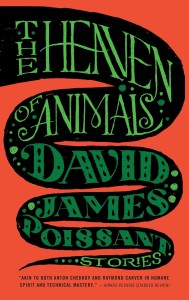 David James Poissant is the author of The Heaven of Animals: Stories (Simon & Schuster, 2014), winner of the 2015 GLCA New Writers Award, the Silver Medal for fiction from the Florida Book Awards, and a finalist for the L.A. Times Book Prize. The Heaven of Animals has been longlisted for the PEN/Robert W. Bingham Prize, named an Amazon Best Book of the Year, and was named the Best Short Story Collection of 2014 by Tweed’s Magazine. Additionally, the book was a Washington Post “Out Now” Pick, a New York Post “Must-Read” Selection, and one of the Atlanta Journal-Constitution’s 9 Best Books of 2014. Poissant’s stories and essays have appeared in The Atlantic Monthly, The Chicago Tribune, Glimmer Train, The New York Times, One Story, Playboy, Ploughshares, The Southern Review, and in several annual anthologies including New Stories from the South and Best New American Voices. He teaches in the MFA Program at the University of Central Florida and lives in Orlando with his wife and daughters.
David James Poissant is the author of The Heaven of Animals: Stories (Simon & Schuster, 2014), winner of the 2015 GLCA New Writers Award, the Silver Medal for fiction from the Florida Book Awards, and a finalist for the L.A. Times Book Prize. The Heaven of Animals has been longlisted for the PEN/Robert W. Bingham Prize, named an Amazon Best Book of the Year, and was named the Best Short Story Collection of 2014 by Tweed’s Magazine. Additionally, the book was a Washington Post “Out Now” Pick, a New York Post “Must-Read” Selection, and one of the Atlanta Journal-Constitution’s 9 Best Books of 2014. Poissant’s stories and essays have appeared in The Atlantic Monthly, The Chicago Tribune, Glimmer Train, The New York Times, One Story, Playboy, Ploughshares, The Southern Review, and in several annual anthologies including New Stories from the South and Best New American Voices. He teaches in the MFA Program at the University of Central Florida and lives in Orlando with his wife and daughters.
I interviewed David James Poissant via phone about his short story collection, The Heaven of Animals: Stories.
When I initially heard, The Heaven of Animals, I wondered about the meaning of the title. I didn’t take it literally, but how humans can be animals. Some people think this is heaven; other people think that heaven is someplace else, so it definitely pulls that question in; what is heaven? It’s that whole idealistic way that people think, and the irony is we may think that, but that’s not how humans behave, so that’s how I took your title.
There are some titles I read and I wonder why did they choose that title? Then I read the book and I still wonder; it doesn’t fit. Your book, I was no longer wondering why you choose the title, but I still want to know. I’m curious. Why did you chose the title, The Heaven of Animals, for this collection?
There are a couple of reasons. Do you know the James Dickey poem, The Heaven of Animals?
No, I’m not familiar with it.
It’s a beautiful poem. It basically asks questions like: Is there really a heaven? If there is a heaven for people, is there one for animals? Can there be a heaven for you if you are a predator? Is there a heaven for prey? Or what if heaven for prey is to be forever hunted and killed by predators, but this is a heaven in which the prey can never die?? It’s a wild idea, complicated and sad, and, of course, once you scratch the surface, it’s a poem about far more than just animals.
Those we love are the ones who end up hurting us, most of the time.
A lot of my stories raise questions about faith, God, and larger universal questions about life and death. There are animals throughout the book, and they contribute in different ways to these larger themes.
100% Cotton is very short, but poignant. By the story’s end, I wanted to cry. It’s the way you ended it that made the story so successful. I’m going to read a quote from the story from page 62, which is also an excellent way of showing and telling of an event (just so readers know this is not the ending):
“We move through the days with our hands at our sides, and I believe that whatever holds us back, whatever keeps people at bay, maybe it’s the same thing that left my mother tethered at the neck by an orange extension cord to our attic’s rafters.”
Even though that is said, I still don’t expect the ending. To me, you twisted it just enough, so that it’s very powerful; I felt socked. You did something very simple, and I’m noticing with a lot of your short stories, it’s simple. You’re not doing complicated things. It’s the way you’re crafting it. Do you understand what I’m saying?
Thank you. I know exactly what you’re saying. For me, that is the centerpiece of the collection. It’s about communication, trying to communicate, the way we communicate, our desperate need for connection, and the way we connect to those we love. Those we love are the ones who end up hurting us, most of the time. That story is the distillation of many of the other stories’ themes.
That section is the highlight of what I hope to do in all of my writing: To talk about love, and connection, and failure of connection, and pain, and how hard we try to reach out to one another, or how we wish we could.
You’ve also tied two themes together: the things that keep us from moving forward, and death—suicide—was this a conscience choice, or did it flow out when you wrote it?
It’s hard to say. That story is about five years old, so I can’t remember. Honestly, that is one of my better lines, so it probably didn’t flow out of me in the first draft. I know that story shrunk by a couple of pages. Often in my revisions, the stories get shorter, not longer, so I’m cutting and cutting. The backstory was about the mother, and then I realized the story could be stronger if I held off on that and revealed the mother in a more powerful moment.
The other fact is that the deaf can, and do sign in their sleep. I was so overcome by that history, and by that image, that I raced home and inserted them into the story I was writing.
I thought that one sentence was beautifully written. You moved the reader forward; you dropped the reader off in a different place from when that sentence first began. I think out of all your stories, this is probably my favorite because it hit me so hard emotionally due to your skill as a writer.
How long did it take you to write this?
I have a pretty good memory with that one. I had a weird idea, I don’t know the motivation, but, so often with writing, I try to write my way into a story to discover the characters and the story. In this situation, I thought of this guy standing on a street corner and trying to get himself shot. The first two pages I wrote, it was over the top, but I got to the point where just before he’d get shot, I thought, hunh, this may never come to anything. I had an interesting idea, but I didn’t know what I was doing with it.
The next day, I was driving home from school, listening to NPR, and there was a special on American Sign Language. There were two facts that I got from that. I can’t remember if it was the 60s, or the 70s, but there was a movement from a lot of people to keep the deaf from using sign language, to train them to speak for the benefit of people who speak aloud.
The other fact is that the deaf can, and do sign in their sleep. I was so overcome by that history, and by that image, that I raced home and inserted them into the story I was writing.
As soon as I added them, the story of the parents crept into the piece, and that was really interesting to me. I wrote the very first draft over two days. But it took over a year of revision before the story was any good. I wasn’t looking at it every day of the year. I would get frustrated. I’d work on it for a few days, put it away, take it out, go over it for a few weeks, put it away, take it out again.
Then, I got really lucky. I managed to catch the attention of The Southern Review. But, the editor there said it was too jokey, and she wanted it cut down. She was right, and the story grew stronger with her edits.
I like my stories to get the reader really laughing, and then for the story to punch the reader in the face. But, if you make the reader laugh too hard, that punch can be a little abrupt.
In “What the Wolf Wants,” what is the wolf representative of? Do you want to say?
There are a couple different ways to answer that question. For me, the wolf represents a belief in regret, regret over the way he behaved before his brother was gone. The narrator says, “I think maybe it takes a while to redeem yourself in the eyes of the dead.” He’s looking for redemption; he’s looking for atonement. So, in some way, the wolf represents that. For him, the redemption comes too late. He can’t redeem himself with the dead.
The ending really got me in this story, too. I didn’t know where you were going with this story, so I was going along with it to see where you were taking me, and then you dropped me.
You had mentioned before the mother was like me—referring to the character—and you sprinkled mentioning the mother, which had a larger impact when the story closed.
I know there is not an actual wolf, but it’s the middle of the night, they’re both plagued by the same death. It’s reaching out to someone else and saying, “Hey, you’re not going to believe what’s happened.” The ending is implied, not explicit, and that’s what I believe is drawing me into the deeper meaning of the story.
I’m curious from a writer’s, and a reader’s standpoint, how did you decide on that particular ending? Did you arrive at it in the editing process, or did you know it when you began?If you have the right image, and the right verb, they hit the reader harder than an excess of words.
I rarely know my endings before I begin, but, with that one, I came to that ending in the very first draft. I did write it in one sitting in two to three hours. I got to that last line. I wanted this story to come full circle. Who was the mother? What became of her? What if he talked to the mother at the end? Of course she would have her own regrets. Even the mother, in the end, is thinking of how she wronged her son.
This is from your short story Nudists, on page 171:
“Lorrie’s car was the one to go through the guardrail, to eat the sky and fall. The river was frozen, and the car cracked it open.” On that same page you wrote, “They glowed like ghosts, like river moons.”
The second part is very poetic.
What’s hitting me is the word eat, the car cracked, it’s your verbs. In the other sentence it’s your use of glowed/ghosts, river/moons. It’s the similarities of the ghosts, and the moons and the glowing of the river. That makes me think of night. For me, this is what separates your work from others.
When you wrote these two passages is this something that immediately came out of your head, or is this something that happened in the editing process?
Thank you. I appreciate that. It definitely comes through revision. I couldn’t see the initial scene. I had the dramatic action set up, but the way it is done is through language. It takes a long time, but I had to get in there and play with the images. If the prose gets to be too wordy, it’s flowery. Revision is all about building a story up, burning it down, and twisting it around. I try not to overuse adjectives. I try not to use adverbs. If you have the right image, and the right verb, they hit the reader harder than an excess of words.
When you’re working on this, are you focusing on one sentence, or a particular passage?
Often it’s a paragraph at a time, and reworking what frames that paragraph.
On page 86 in Refund, “Joy was talented and she was smart, but she was also afraid the way we’re all afraid. What happened if she put herself out there, studied, painted, cast a line and nobody bit? And so she’d settled. She’s settled on me.”
The reason I like this is that it’s very simple, to the point and accurate. I think there are a lot of people out there that do that. It’s the simplicity that is such a draw because it’s honest. Is this something you purposely wrote to grab your reader?

Yes, I’m always trying to get to the truth, but there is different truth for everybody, so that’s not going to represent everyone’s experience. So, I try to get each scene true to each viewpoint character’s experience. For some readers, a scene or line is going to hit them harder than for others; but, hopefully, it doesn’t feel contrived. You can’t make everything universal for everyone.
I loved “Lizard Man.” I didn’t pull any quotes from it, but I really enjoyed the story.
That was one thing that never changed from the inception of the story collection. Everything got moved around, but not the first and last story. They were the bookends of the collection. I also like the fact that the story is set in the South, and I’m from there—the South—and the last story is set in the West. For me, that’s a nod to myself about where I’m from and where I’m going in my fiction.
The paperback of The Heaven of Animals: Stories was released this past March.
Check back next week for the continuation of the my interview with David James Poissant where he will discuss the importance of reading, research and his next project, his first novel.
